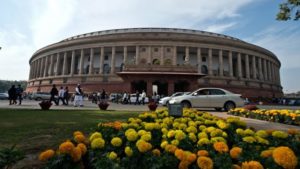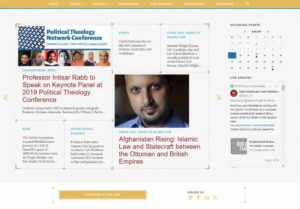
 SPOTLIGHT :: India’s Criminalization of Extrajudicial Divorce The Indian legislature recently passed a legislative response to the country’s Supreme Court decision two years ago condemning a form of extrajudicial divorce in India, by which Muslim men pronounce the Arabic word for divorce three times (“triple ṭalāq“) and claim the practice to be authorized by classical Islamic law. The judges in the 2017 Shayara Bano case called their claim into question, and asked Parliament to intervene . In reviewing the case, LUMS Professor and SHARIAsource editor Zubair Abbasi in Pakistan noted that the Court had outlawed the practice of triple ṭalāq because it violated Muslim women’s constitutional rights. The Court gave the legislature six months to pass legislation that would address the problem. The legislature took up the charge but only passed legislation two years later, earlier this summer in 2019. Reviewing that legislation, Abbasi now assesses whether the law can protect women through criminalizing the practice among the men: “The Act, as its name suggests, is to protect the rights of married Muslim women by safeguarding them from being instantly divorced by their husbands. The Act does so by declaring triple ṭalāq to be ‘void and illegal’ and subjecting the offender husbands to imprisonment of three years and an unspecified fine.” Critics of the law raise concerns that it will prosecute Muslim men but has not taken affirmative measures to protect women. Abbasi’s concedes to the critics’ concerns and underscores the importance of focusing on how the law might protect Muslim women. Read more . Image credit: BBC
SPOTLIGHT :: India’s Criminalization of Extrajudicial Divorce The Indian legislature recently passed a legislative response to the country’s Supreme Court decision two years ago condemning a form of extrajudicial divorce in India, by which Muslim men pronounce the Arabic word for divorce three times (“triple ṭalāq“) and claim the practice to be authorized by classical Islamic law. The judges in the 2017 Shayara Bano case called their claim into question, and asked Parliament to intervene . In reviewing the case, LUMS Professor and SHARIAsource editor Zubair Abbasi in Pakistan noted that the Court had outlawed the practice of triple ṭalāq because it violated Muslim women’s constitutional rights. The Court gave the legislature six months to pass legislation that would address the problem. The legislature took up the charge but only passed legislation two years later, earlier this summer in 2019. Reviewing that legislation, Abbasi now assesses whether the law can protect women through criminalizing the practice among the men: “The Act, as its name suggests, is to protect the rights of married Muslim women by safeguarding them from being instantly divorced by their husbands. The Act does so by declaring triple ṭalāq to be ‘void and illegal’ and subjecting the offender husbands to imprisonment of three years and an unspecified fine.” Critics of the law raise concerns that it will prosecute Muslim men but has not taken affirmative measures to protect women. Abbasi’s concedes to the critics’ concerns and underscores the importance of focusing on how the law might protect Muslim women. Read more . Image credit: BBC
 New Legislation :: Muslim Women Act of 2019 [India] In Shayara Bano v. Union of India (2017), the Supreme Court of India declared the practice of triple ṭalāq (instant divorce) to be an unconstitutional violation of Muslim women’s rights. Recently passed legislation, the Muslim Women (Protection of Rights on Marriage) Act of 2019 is the legislative response to that judgment . It criminalizes the practice of extrajudicial divorce through triple ṭalāq with the aim of protecting Muslim women subjected to it. Read more . Image credit: India Today
New Legislation :: Muslim Women Act of 2019 [India] In Shayara Bano v. Union of India (2017), the Supreme Court of India declared the practice of triple ṭalāq (instant divorce) to be an unconstitutional violation of Muslim women’s rights. Recently passed legislation, the Muslim Women (Protection of Rights on Marriage) Act of 2019 is the legislative response to that judgment . It criminalizes the practice of extrajudicial divorce through triple ṭalāq with the aim of protecting Muslim women subjected to it. Read more . Image credit: India Today
 CNEWS: New PIL Website We are happy to announce the launch of our new program website. Here, you can meet the evolving group of dynamic professors, fellows, and students working in the field, find out about our events at Harvard, and discover the range of global events and opportunities through a constantly updated clearinghouse of jobs, conferences/CFPs, and grants in Islamic legal studies and related fields around the world. Scholars may be especially interested in our fellowship announcements, publications, and projects. Students can learn about relevant courses at Harvard and area schools, opportunities for travel grants, and an annual paper prize sponsored by the dean’s office at HLS. A one-stop shop for all things related to the academic study of Islamic law and history. Image credit: PIL
CNEWS: New PIL Website We are happy to announce the launch of our new program website. Here, you can meet the evolving group of dynamic professors, fellows, and students working in the field, find out about our events at Harvard, and discover the range of global events and opportunities through a constantly updated clearinghouse of jobs, conferences/CFPs, and grants in Islamic legal studies and related fields around the world. Scholars may be especially interested in our fellowship announcements, publications, and projects. Students can learn about relevant courses at Harvard and area schools, opportunities for travel grants, and an annual paper prize sponsored by the dean’s office at HLS. A one-stop shop for all things related to the academic study of Islamic law and history. Image credit: PIL
See the full newsletter.

